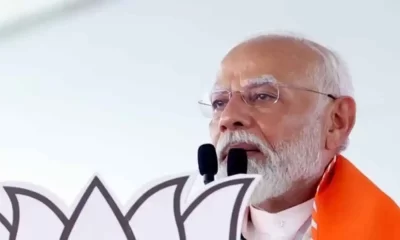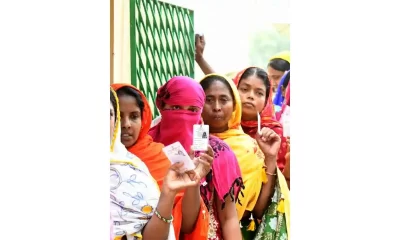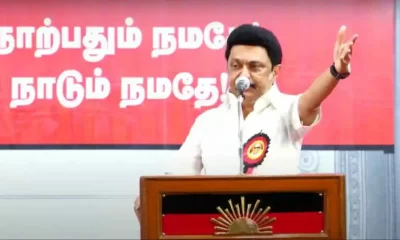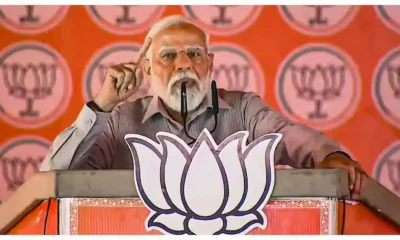Latest world news
Sorting out Indo-US differences on trade: Mike Pompeo says ‘Modi hai to mumkin hai’
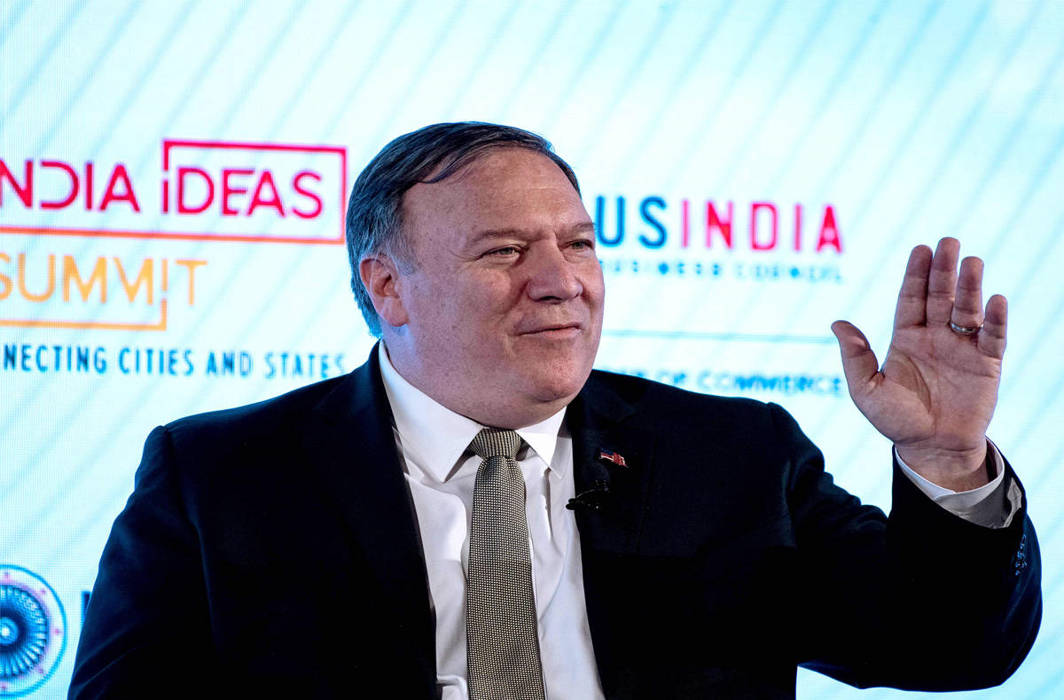
[vc_row][vc_column][vc_column_text]
Expressing hope that India would lift trade barriers, US Secretary of State Michael Pompeo hinted that it was possible to reinstate the Generalized System of Preferences (GSP), a programme for preferential access to certain goods markets in the US, for India.
Pompeo is expected to discuss this as well as 5G network technology and data localisation while in New Delhi later this month on a visit. He will travel to India, Sri Lanka, Japan and South Korea from June 24 to 30. Mike Pompeo’s four-nation tour is aimed at deepening US partnerships in the strategic Indo-Pacific region.
Putting his own spin on the BJP poll slogan, Pompeo, in a speech at the India Ideas Summit of US-India Business Council on Wednesday, June 12, said: “As Prime Minister (Narendra) Modi said in his latest campaign, ‘Modi hai to mumkin hai,” or ‘Modi makes it possible”, I am looking forward to explore what’s possible between the US and India.”
“I am very much looking forward to my trip to New Delhi later this month, and meeting PM Modi, and my new counterpart, External Affairs Minister S Jaishankar,” he said.
Mike Pompeo listed out some of the “big ideas and big opportunities” that can take bilateral relationship between US and India to a new level.
He said differences between the two countries remain in some of the key trade and business issues, he acknowledged. “We’ll probably discuss the recent decision about the GSP program…we remain open to dialogue, and hope that our friends in India will drop their trade barriers and trust the competitiveness of their own companies, their own businesses, their own people and private sector companies,”
In addition to GSP, data localisation regulations and proposed policies have been a source of friction between the two countries.
“We’ll also push for free flow of data across borders, not just to help American companies, but to protect data and secure consumers’ privacy,” Pompeo said.
“And speaking of privacy, we are eager to help India establish secure communications networks — including 5G networks as well,” Pompeo said.
The Trump administration is pushing its allies and partner countries to block the Chinese telecom giant Huawei from participating in building their next generation (5G) telecommunication networks and has put Huawei on a trade blacklist for US companies.
Pompeo went to some lengths to stress that the US understood India’s post-Independence economic history and current geopolitical realities, Pompeo touched on a common theme — a India-US partnership based on values.
India and the US, he said, must embrace the strategic framework that works for both the nations. “We get it. We respect India as a sovereign power, with its own unique politics and strategic challenges. We realize it’s different to deal with the likes of China and Pakistan from across the ocean than it is when they are on your borders. That’s why in this room and not so many months ago, I elaborated on President Trump’s vision for a free and open Indo-Pacific,” Pompeo said.
Giving a preview of his India mission, he said he truly believes the two nations have a unique opportunity to move forward together for the good of their people, the Indo-Pacific region, and the world.
Making a strong case for a free and open Indo-Pacific, he said it starts from the premise that the two share common values of democracy, freedom, and a belief in the ingenuity of the human spirit. “It’s only natural that the world’s most populous democracy should partner with the world’s oldest democracy to maintain their shared vision for the Indo-Pacific.”
“Third, we have to deliver,” Pompeo said.
He said under President Donald Trump, the US has taken defence cooperation to newer heights, solidified their common vision for the Indo-Pacific and taken a far tougher stand on Pakistan’s unacceptable support for terrorism.
“Forging strong ties means formalizing these individual friendships. Last year, we kicked off the ‘2+2 dialogue’ alongside the Department of Defence. We’ve also reinvigorated the Quad Dialogue among India, the United States, Japan, and Australia – all like-minded democracies in the Indo-Pacific. These are all good steps,” he said.
The Trump Administration has already enabled American companies to export more high technology items to India, including cutting-edge defence platforms like armed UAVs and ballistic missile defence systems. “We’ve already launched the Asia-EDGE programme, to help India raise private capital to meet its energy security and access needs,” he said.
“These are solid achievements, but we want to do much more. We clearly have overlapping interests in defence, energy, and space,” he said.
Mike Pompeo said the first batch of India’s Apache helicopters are coming off Boeing’s production line in Arizona. Lockheed Martins F-21 and Boeing’s F/A-18 are state-of-the-art fighters that could give India the capabilities it needs to become a full-fledged security provider in the strategic Indo-Pacific region.
On space, NASA is already working with the Indian Space Research Organisation on the world’s most advanced earth-observation satellite and India’s second lunar mission.
Pompeo also used the dais to make a pitch for US crude oil and natural gas during a question answer session with LNG company Tellurian’s CEO, Meg Gentle.
“On energy, we want to complete the Westinghouse civil nuclear project, and deliver more American LNG and crude,” he said adding that these steps will give Indians reliable and abundant energy and help reduce dependence on regimes like Iran and Venezuela.
“We’ve been blessed with abundant affordable energy right here in the United States, and we’re now out producing it at enormous levels, not just crude oil but natural gas as well,” Pompeo said, adding that the U.S. would need to ensure that it had the infrastructure for delivery.
Under threat of US sanctions, India had, reluctantly, stopped oil imports from Venezuela and Iran, India’s ambassador to the US Harsh Vardhan Shringla told the press at the end of May. On Monday, Petroleum Minister Dharmendra Pradhan spoke with U.S. Energy Secretary Rick Perry about volatile oil prices and energy security.
“They [buyers of US fuel] can have a fully diversified energy portfolio where they don’t have to rely on nations that aren’t as reliable as the United States,” Pompeo said.[/vc_column_text][/vc_column][/vc_row]
Latest world news
World Earth Day 2024: Google Doodle showcases aerial view of planet’s natural beauty
Google celebrated Earth Day 2024 with a special doodle featuring an aerial view of our planet’s biodiversity.
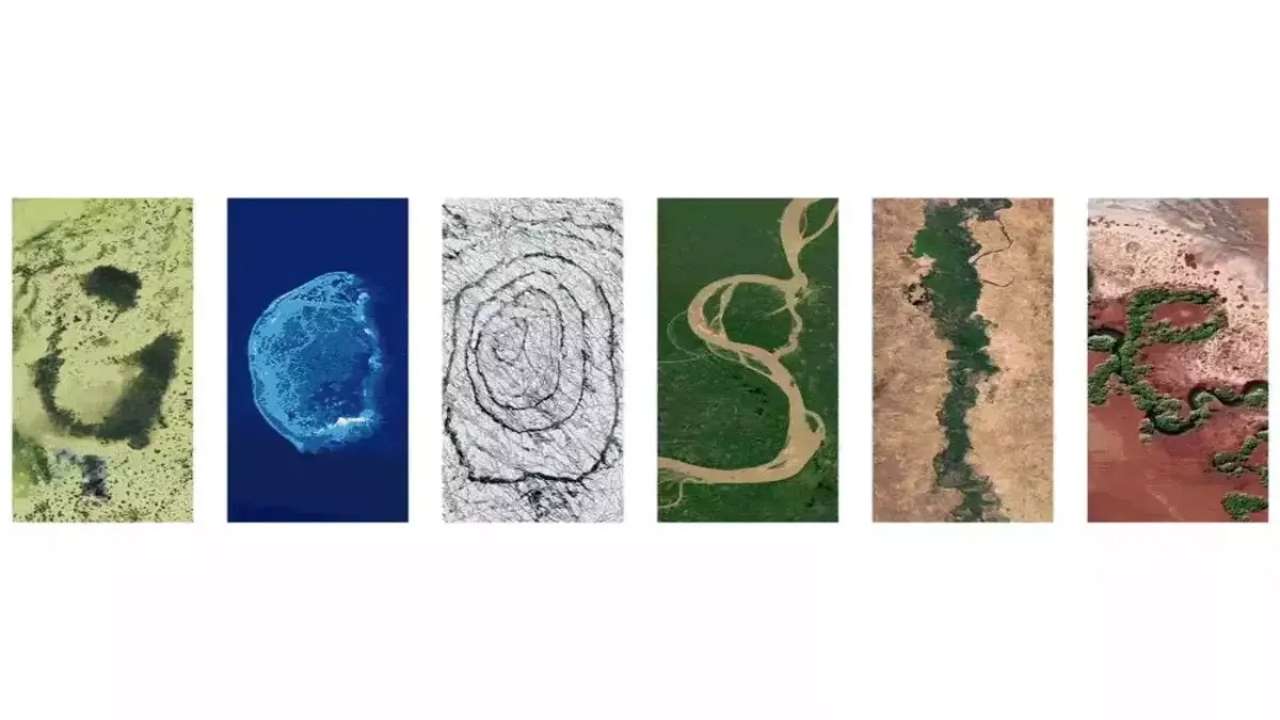
Google shared a doodle today to celebrate World Earth Day 2024, which showcased aerial photos of the planet’s biodiversity and natural beauty. Google reminded us of the importance of protecting planet earth for future generations with the help of this doodle.
The Google letters depict specific locations across the globe where people, communities, and governments work every day to help protect the planet’s natural beauty, biodiversity, and resources, according to the explanation of the annual Earth Day 2024 doodle on their website.
It said, these examples remind us that there’s much more to do to address the climate crisis and biodiversity loss, but also offer the promise of hope and optimism.
The islands of Turks and Caicos are represented by the letter “G.” The islands’ conservation efforts are concentrated on protecting important regions for biodiversity and addressing persistent environmental problems.
The largest reef in the southern Gulf of Mexico and a UNESCO biosphere reserve, Scorpion Reef National Park, is represented by the letter “O” in the Mexican flag.
The letter “O” features Iceland’s Vatnajokull National Park, which was designated as a national park in 2008 following decades of advocacy. The ecology within and surrounding the biggest glacier in Europe is safeguarded by this UNESCO World Heritage Site.
The letter “G” has the Jau National Park in Brazil on it. It is a UNESCO World Heritage Site and one of the biggest forest reserves in South America.
The Great Green Wall of Nigeria is represented by the letter “L,” and the Pilbara Islands Nature Reserves of Australia are represented by the letter “E.”
Meanwhile, Earth Day is a worldwide event that promotes protection of the environment every year. April 22 serves as a reminder of the importance of conservation efforts and sustainable practices to guarantee a healthier world and a brighter future.
The occasion inspires people across the world to come together and take action to protect the environment, strengthening our bonds with nature and promoting good change.
Latest world news
Bigg Boss 14 contestant Rahul Vaidya struggles walking in knee deep water, compares Dubai rains with Mumbai floods
Singer and TV personality Rahul Vaidya was recently stranded in the Dubai rains.

Rahul Vaidya, who was in Dubai ahead of his show which was scheduled to take place today, left the country due to heavy rains and reached Kolkata. The artist shared on social media his encounters in the UAE city, including challenges like walking through knee-deep water. Rahul provided an update regarding the heavy rainfall in Dubai on his Instagram profile.
The Bigg Boss 14 contestant revealed that he was in Kolkata and prepared to do an evening performance. Recalling the terrifying period he went through, Vaidya said there was a lot of confusion and panic in Dubai. The situation was similar to that when heavy floods hit Mumbai in 2005.
Vaiday also posted seval other images and videos of cars that were underwater and flooded roadways. The Bigg Boss 14 contestant, who shared his ordeal, claimed that even though it had just rained for two hours, the situation was dire.
In one of the video, which went viral he can be seen struggling in walking in knee-deep water. He can be also seen holding his sneakers in one hand and with other hand he was seen managing other things.
This is the result of the two hours of rain that it had, he can be heard saying in the video. Vidya also said he dosen’t believe Dubai is accustomed to a lot of rain. Everything had stopped working, he remarked.
After taking part in the first season of the singing reality show Indian Idol, Rahul Vaidya gained widespread recognition. In addition to Bigg Boss, he took part in Khatron Ke Khiladi 11.
Meanwhile, heavy rains that triggered flooding in the UAE and Bahrain, which left 18 people dead in Oman on Sunday and Monday, have paralyzed the financial hub of the Middle East, Dubai.
A lot of incoming flights were diverted from Dubai’s international airport because of the rain. At 7:26 p.m., the busiest airport in the world for foreign visitors stopped accepting new arrivals; a gradual resumption was announced for more than two hours later.
Images of planes navigating flooded tarmacs are making the rounds on social media.
According to pictures shared on social media, the flagship malls Dubai Mall and Mall of the Emirates both experienced heavy floods, while at least one Dubai Metro station had water up to the ankles.
There were several road collapses, severe flooding in residential areas, and numerous reports of leaks from windows, doors, and roofs.
Due to the unfavourable weather, schools around the United Arab Emirates were forced to close, and as more storms are predicted, the closures are anticipated to last until Wednesday. The government of Dubai allowed its staff to work remotely till this Wednesday.
Latest world news
Dubai sky turns green during storm in UAE, video goes viral
The UAE witnessed record-breaking rainfall on Tuesday and the National Centre of Meteorology recorded 254 mm of rainfall in less than 24 hrs in the Khatm Al Shakla area in Al Ain.

1 person was killed in UAE as it witnessed heavy rainfall on Tuesday, stranding commuters, flooding roads, disrupting trains and flights and resulting in water leakage from mall ceilings. The UAE witnessed record-breaking rainfall on Tuesday and the National Centre of Meteorology recorded 254 mm of rainfall in less than 24 hrs in the Khatm Al Shakla area in Al Ain. It is being said that the rainfall was the highest documented since the start of data collection in 1949.
The heavy rainfall in UAE came days after a similar situation in neighbouring Oman, where 13 people were killed in flash floods. Many parts of Oman saw torrential rains, which caused students to be trapped in buses and swept away motorists and trapped people in their homes.
Videos from Dubai circulating on social media showed widespread waterlogging on roads in Abu Dhabi, Dubai and other important cities. This left daily commuters in cars and other vehicles struggling to get back home. Dubai metro station too was seen flooded and closed.
One such video circulating on social media shows the aerial view of the city of Dubai from the top of a building. In the video the stormy winds are seen blowing over the city of Dubai. As the storm intensifies the Dubai sky turns green and ultimately gets covered by heavy rainfall. The video has gone viral on social media with more than 1.1 million views.
Another video showed water leakage from the ceilings of shopping malls, flooding the floors and destroying goods. A video which was shot in the famous Mall of the Emirates, showed pieces of ceiling falling as the rainwater gushed inside. Videos from many outlets of the Deira City Centre mall chain showed escalators being rendered unusable. Majid Al Futtaim, the company which owns the Mall of Emirates, said that the shopping complexes have been kept open and the customers are being sent away from the flooded areas.
-

 Cricket news22 hours ago
Cricket news22 hours agoIPL 2024: Yashasvi Jaiswal hits brilliant century to help Rajasthan Royals beat Mumbai Indians by 9 wickets
-
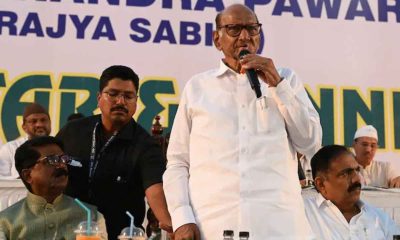
 2024 Lok Sabha Elections21 hours ago
2024 Lok Sabha Elections21 hours agoNCP (SP) leader Sharad Pawar says Prime Minister Narendra Modi is trying to create fear like Russian President Vladimir Putin
-

 Entertainment20 hours ago
Entertainment20 hours agoMithun Chakraborty, Usha Uthup honoured with Padma Bhushan
-

 Entertainment18 hours ago
Entertainment18 hours agoFan jumps on stage and hugs Atif Aslam during concert, video goes viral
-
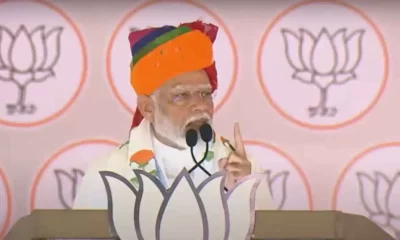
 2024 Lok Sabha Elections20 hours ago
2024 Lok Sabha Elections20 hours agoPrime Minister Narendra Modi says listening to Hanuman Chalisa under Congress rule is a crime
-

 Entertainment16 hours ago
Entertainment16 hours agoManisha Koirala reveals reason for rejecting Dil To Pagal Hai, says regrets that decision
-
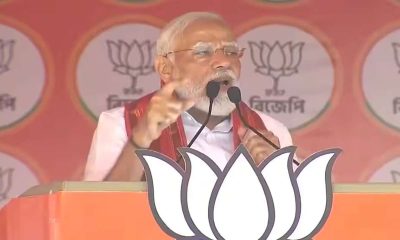
 2024 Lok Sabha Elections15 hours ago
2024 Lok Sabha Elections15 hours agoPM Modi says Congress leaders consider themselves above Lord Ram
-
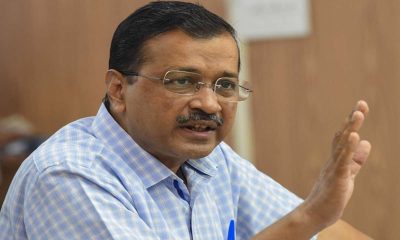
 India News22 hours ago
India News22 hours agoArvind Kejriwal given insulin in Tihar jail after sugar levels touch 320

